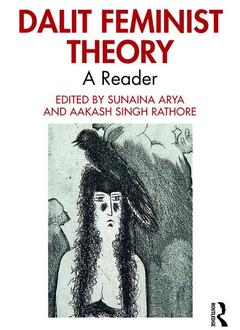Dalit Feminist Theory A Reader
Coordonnateurs : Arya Sunaina, Rathore Aakash Singh

Dalit Feminist Theory: A Reader radically redefines feminism by introducing the category of Dalit into the core of feminist thought. It supplements feminism by adding caste to its study and praxis; it also re-examines and rethinks Indian feminism by replacing it with a new paradigm, namely, that caste-based feminist inquiry offers the only theoretical vantage point for comprehensively addressing gender-based injustices.
Drawing on a variety of disciplines, the chapters in the volume discuss key themes such as Indian feminism versus Dalit feminism; the emerging concept of Dalit patriarchy; the predecessors of Dalit feminism, such as Phule and Ambedkar; the meaning and value of lived experience; the concept of Difference; the analogical relationship between Black feminism and Dalit feminism; the intersectionality debate; and the theory-versus-experience debate. They also provide a conceptual, historical, empirical and philosophical understanding of feminism in India today.
Accessible, essential and ingenious in its approach, this book is for students, teachers and specialist scholars, as well as activists and the interested general reader. It will be indispensable for those engaged in gender studies, women?s studies, sociology of caste, political science and political theory, philosophy and feminism, Ambedkar studies, and for anyone working in the areas of caste, class or gender-based discrimination, exclusion and inequality.
Introduction: Theorizing Dalit Feminism Sunaina Arya and Aakash Singh Rathore PART I. Indian Feminism vs Dalit Feminism 1. A Critical View on Intersectionality Nivedita Menon 2. Problems for a Contemporary Theory of Gender Susie Tharu and Tejaswini Niranjana 3. Indian Feminism and ‘Dalit Patriarchy’ Gopal Guru; V. Geetha; Uma Chakravarti PART II. Predecessors of Dalit Feminism 4. Dalit Women’s Agency and Phule-Ambedkarite Feminism Shailaja Paik 5. Ambedkarite Women Wandana Sonalkar 6. Ramabai and Ambedkar Sharmila Rege PART III. Lived Experience as 'Difference' 7. Brahmanical Nature of Violence Against Women Sharmila Rege 8. Vilifying Dalit Women: Epics and Aesthetics Vizia Bharati; Y.S. Alone 9. Dalit Women's Autobiographies Sharmila Rege PART IV. What Difference does 'Difference' Make? 10. 'Difference' through Intersectionality Kimberlé Crenshaw11. Dalit Women Talk Differently Gopal Guru 12. Debating Dalit Difference Sharmila Rege PART V. Intersectionality in India 13. Why Intersectionality is Necessary S.J. Aloysius, J.P. Mangubhai and J.G. Lee 14. The Dalit Woman Question Susie Tharu 15. Responses to Indian Feminists’ Objections Mary E. John;Meena Gopal PART VI. Toward a Dalit Feminist Theory 16. Feminist Fictions: A Critique of Indian Feminism Julie Stephens17. Revitalising Dalit Feminism Smita M. Patil 18. Dalit Women’s Experience: Toward a Dalit Feminist Theory Kanchana Mahadevan
Sunaina Arya is Senior Research Fellow at the Centre for Philosophy, Jawaharlal Nehru University, New Delhi, India, where she is completing a dissertation on feminist philosophy from a Dalit perspective. She earned her MPhil and MA from the same centre. She received an Honourable Mention in the Blue Stone Rising Scholar Prize (2019) by The Heller School of Social Policy and Management, Brandeis University, Massachusetts, USA, and is founding member of Global Dalit Change Makers, an initiative of the India China Institute, The New School, New York City, USA. She has been a resource person for lectures, public talks, workshops, podcasts and webinars in India and abroad. Her area of research includes social and political philosophy of B. R. Ambedkar, philosophy and psychology, and the philosophy of social sciences. Her recent publications include ‘Dalit or Brahmanical Patriarchy? Rethinking Indian Feminism’ (2020), ‘Theorising Gender in South Asia: Dalit Feminist Perspective’ (2020) and ‘Ambedkar as a Feminist Philosopher’ (forthcoming). She has edited (with Ashok Gurung) the Gender special issue of CASTE: A Global Journal on Social Exclusion.
Aakash Singh Rathore is a Fellow of the Indian Institute of Advanced Study, Shimla, and an International Fellow of the Centre for Ethics and Global Politics-LUISS, Rome, Italy. He has taught at Jawaharlal Nehru University and other universities, including Delhi, Toronto, Berlin, Rutgers and Pennsylvania. He is the author of eight books, including Indian Political Theory (2017), Plato’s Labyrinth (2018), A Philosophy of Autobiography (2019), and Ambedkar's Preamble: A Secret History of the Constitution of India (2020), and is chief editor of B. R. Ambedkar: The Quest for Justice (5 volumes). He is the series editor of Rethinking India (14 volumes, forthcoming) and editor of its first volume, Vision for a Nation (with Ashis Nandy). Among his other forthcoming w
Date de parution : 09-2019
15.6x23.4 cm
Date de parution : 09-2019
15.6x23.4 cm
Thèmes de Dalit Feminist Theory :
Mots-clés :
Young Men; Dalit Women; Dalit; Urmila Pawar; women; South Asian Feminism; Dalit Feminist; difference; Bhanwari Devi; feminism; Dalit Feminist Standpoint; caste; Dalit Women’s Labour; sexuality; Dalit Writers; patriarchy; Dalit Literature; class; Sharmila Rege; intersectionality; Dalit Men; experience; Dalit Feminism; Ambedkar; Dalit Women’s Experience; theory; Brahmanical Patriarchy; BR Ambedkar; Hindu Code Bill; B; R; Ambedkar; non-Dalit Women; B.R; Ambedkar; Dalit Patriarchy; gender; Single Axis Framework; justice; Uma Chakravarti; black; Gopal Guru; black feminism; Indian Feminism; philosophy; Low Caste Women; epics; Dalit Community; aesthetics; Shetkari Sanghatana; brahmanism; India; Politics; brahminism; feminist theory; caste-based feminist inquiry; Indian patriarchal system; gender-based injustices



